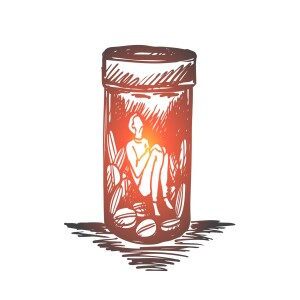Aced It
The Aced It podcast is the place to go if you‘re trying to find out what‘s new in the health and justice research world, but don‘t have the time, energy, or know-how to decipher all that academic writing. Dr. Danielle Rudes and Shannon Magnuson from the Center for Advancing Correctional Excellence (ACE!) at George Mason University developed the Aced It! podcast to bring relevant research articles to a broader audience by putting them into layperson’s terms sharing the findings and implications in about 15 minutes.
The Aced It podcast is the place to go if you‘re trying to find out what‘s new in the health and justice research world, but don‘t have the time, energy, or know-how to decipher all that academic writing. Dr. Danielle Rudes and Shannon Magnuson from the Center for Advancing Correctional Excellence (ACE!) at George Mason University developed the Aced It! podcast to bring relevant research articles to a broader audience by putting them into layperson’s terms sharing the findings and implications in about 15 minutes.
Episodes

Tuesday Mar 11, 2025
Overdoses Post-Release
Tuesday Mar 11, 2025
Tuesday Mar 11, 2025
In this episode, we explore the critical challenges faced by individuals reintegrating into society after incarceration, with a focus on the alarming risk of overdose. Drawing from recent studies, we look at the stark reality that those recently released from prison are at a significantly higher risk of overdose, particularly within the first few weeks. Personal accounts reveal the harsh conditions and limited support that exacerbate this risk, from economic hardship to pervasive drug availability in reentry environments. We highlight the vital need for preventive measures such as naloxone distribution, behavioral health treatment, and supportive community resources.
Download the one-pager (PDF).
This project was supported by Grant [5PBJA-22-AG-00031-MUMU] awarded by the Bureau of Justice Assistance. The Bureau of Justice Assistance is a component of the Office of Justice Programs, which also includes the Bureau of Justice Statistics, the National Institute of Justice, the Office of Juvenile Justice and Delinquency Prevention, the Office for Victims of Crime, and Office of Sex Offender Sentencing, Monitoring, Apprehending, Registering, and Tracking. Points of view or opinions in this podcast are those of the host and the research team and do not necessarily represent the official position or policies of the U.S. Department of Justice.

Tuesday Mar 04, 2025
Overdoses in Carceral Settings
Tuesday Mar 04, 2025
Tuesday Mar 04, 2025
We explore the critical intersection of opioid use disorders and the criminal justice system. We'll discuss why opioid addiction is so prevalent among incarcerated individuals and the significant challenges they face during incarceration. Learn about the importance of medication-assisted treatment, improved reentry programs, and addressing structural barriers to reduce overdose rates.
Download the one-pager (PDF).
This project was supported by Grant [5PBJA-22-AG-00031-MUMU] awarded by the Bureau of Justice Assistance. The Bureau of Justice Assistance is a component of the Office of Justice Programs, which also includes the Bureau of Justice Statistics, the National Institute of Justice, the Office of Juvenile Justice and Delinquency Prevention, the Office for Victims of Crime, and Office of Sex Offender Sentencing, Monitoring, Apprehending, Registering, and Tracking. Points of view or opinions in this podcast are those of the host and the research team and do not necessarily represent the official position or policies of the U.S. Department of Justice.

Tuesday Feb 25, 2025
Risk Factors for Overdose
Tuesday Feb 25, 2025
Tuesday Feb 25, 2025
In today’s episode, we tackle the complex issue of opioid overdose and its risk factors. We’ll break down insights from two pivotal studies, focusing on what increases the likelihood of overdose and how social and environmental factors play a role. We’ll also discuss the critical importance of naloxone and its role in saving lives. Stay with us as we explore how understanding these factors can lead to more effective interventions and better support for those at risk. Don’t miss this essential conversation!
Download the one-pager (PDF).
This project was supported by Grant [5PBJA-22-AG-00031-MUMU] awarded by the Bureau of Justice Assistance. The Bureau of Justice Assistance is a component of the Office of Justice Programs, which also includes the Bureau of Justice Statistics, the National Institute of Justice, the Office of Juvenile Justice and Delinquency Prevention, the Office for Victims of Crime, and Office of Sex Offender Sentencing, Monitoring, Apprehending, Registering, and Tracking. Points of view or opinions in this podcast are those of the host and the research team and do not necessarily represent the official position or policies of the U.S. Department of Justice.

Tuesday Feb 18, 2025
Overdose Statistics
Tuesday Feb 18, 2025
Tuesday Feb 18, 2025
We confront the staggering impact of the opioid epidemic, by delving into recent research that illuminates its widespread devastation. Drug overdose deaths, now a leading cause of injury death among adults, have surged dramatically in recent years, surpassing 100,000 annually in the United States alone. From the origins of the crisis driven by prescription opioids to the emergence of synthetic opioids like fentanyl, we explore how this epidemic has evolved and its profound implications for individuals, families, and communities. Join us as we unpack the complex dynamics of this public health crisis.
Download the one-pager (PDF).
This project was supported by Grant [5PBJA-22-AG-00031-MUMU] awarded by the Bureau of Justice Assistance. The Bureau of Justice Assistance is a component of the Office of Justice Programs, which also includes the Bureau of Justice Statistics, the National Institute of Justice, the Office of Juvenile Justice and Delinquency Prevention, the Office for Victims of Crime, and Office of Sex Offender Sentencing, Monitoring, Apprehending, Registering, and Tracking. Points of view or opinions in this podcast are those of the host and the research team and do not necessarily represent the official position or policies of the U.S. Department of Justice.

Friday Feb 14, 2025
Climate & Culture (S1E2)
Friday Feb 14, 2025
Friday Feb 14, 2025
The way things work inside an organization or “how things get done” is what we commonly refer to as the culture or climate of an organization. But culture is more than just that… it is often a facilitator or a barrier to change and reform AND studying it is hard. In this episode, we discuss the many layers of culture and climate and why/how each matters.
For more information, download the one-pager for this episode (PDF)

Tuesday Feb 11, 2025
Opioid Epidemic
Tuesday Feb 11, 2025
Tuesday Feb 11, 2025
In this episode, we dive into the opioid crisis, focusing on recent trends and social factors. We’ll explore how fentanyl overdoses have surged across different regions and communities and discuss the key social issues like poverty and stigma that contribute to the epidemic. Join us for a closer look at these important studies and what they reveal about the path forward in tackling this crisis.
Download the one-pager (PDF).
This project was supported by Grant [5PBJA-22-AG-00031-MUMU] awarded by the Bureau of Justice Assistance. The Bureau of Justice Assistance is a component of the Office of Justice Programs, which also includes the Bureau of Justice Statistics, the National Institute of Justice, the Office of Juvenile Justice and Delinquency Prevention, the Office for Victims of Crime, and Office of Sex Offender Sentencing, Monitoring, Apprehending, Registering, and Tracking. Points of view or opinions in this podcast are those of the host and the research team and do not necessarily represent the official position or policies of the U.S. Department of Justice.

Tuesday Feb 04, 2025
Dignity in SUD Treatment
Tuesday Feb 04, 2025
Tuesday Feb 04, 2025
In this season’s final episode, we explore the concept of dignity in home-based treatment for individuals with substance use disorders. We discuss recent research showing that someone’s dignity is enhanced when they are shown respect, cared for, and engaged in consistent and informed interactions. On the other hand, dignity is undermined in the presence of stigma, prejudice, or disrespect. Listen to this episode to learn why understanding these factors can improve the quality of care for individuals and is essential to bettering harm reduction efforts.
Download the one-pager (PDF).
This project was supported by Grant [5PBJA-22-AG-00031-MUMU] awarded by the Bureau of Justice Assistance. The Bureau of Justice Assistance is a component of the Office of Justice Programs, which also includes the Bureau of Justice Statistics, the National Institute of Justice, the Office of Juvenile Justice and Delinquency Prevention, the Office for Victims of Crime, and Office of Sex Offender Sentencing, Monitoring, Apprehending, Registering, and Tracking. Points of view or opinions in this podcast are those of the host and the research team and do not necessarily represent the official position or policies of the U.S. Department of Justice.

Tuesday Jan 28, 2025
Empowering Change: The Impact of Peer Recovery Support
Tuesday Jan 28, 2025
Tuesday Jan 28, 2025
Having a sympathetic person by your side during difficult times of your life, like during recovery, can make barriers easier to overcome. Peer-recovery coaches can provide just this kind of support! In this episode, we look at what two decades worth of scholarship has to say about the usefulness of working with a peer-recovery specialist. From lowering rates of drug use and hospitalization to helping with behavioral-activation techniques, peer-recovery support is proving to be a quintessential aid to individuals who struggle with substances.
Download the one-pager (PDF).
This project was supported by Grant [5PBJA-22-AG-00031-MUMU] awarded by the Bureau of Justice Assistance. The Bureau of Justice Assistance is a component of the Office of Justice Programs, which also includes the Bureau of Justice Statistics, the National Institute of Justice, the Office of Juvenile Justice and Delinquency Prevention, the Office for Victims of Crime, and Office of Sex Offender Sentencing, Monitoring, Apprehending, Registering, and Tracking. Points of view or opinions in this podcast are those of the host and the research team and do not necessarily represent the official position or policies of the U.S. Department of Justice.

Tuesday Jan 21, 2025
Mobile Harm Reduction Units
Tuesday Jan 21, 2025
Tuesday Jan 21, 2025
Launched in 2018, the Community Care in Reach program, a mobile health unit, offers on-demand care for individuals who use substances. This vital care includes naloxone kits, syringe distribution, and other treatments, which are provided to marginalized populations. In this episode, we discuss the results of a study that examines this program’s impact, highlighting how it has successfully increased access to services for those who need it most. We also touch on future evaluations to assess the program’s cost-effectiveness and potential for broader implementation.
Download the one-pager (PDF).
This project was supported by Grant [5PBJA-22-AG-00031-MUMU] awarded by the Bureau of Justice Assistance. The Bureau of Justice Assistance is a component of the Office of Justice Programs, which also includes the Bureau of Justice Statistics, the National Institute of Justice, the Office of Juvenile Justice and Delinquency Prevention, the Office for Victims of Crime, and Office of Sex Offender Sentencing, Monitoring, Apprehending, Registering, and Tracking. Points of view or opinions in this podcast are those of the host and the research team and do not necessarily represent the official position or policies of the U.S. Department of Justice.

Tuesday Jan 14, 2025
Safe Spaces: Evaluating Supervised Injection Programs
Tuesday Jan 14, 2025
Tuesday Jan 14, 2025
Supervised injection sites are a controversial topic. In fact, the United States still considers them illegal. Yet research out of Europe, Canada, and Australia all point towards the efficacy of these sites. In this episode, we dive into the scholarship that examines safe injection sites, and the effects they have on overdose mortality, injection behaviors, treatment access, and even neighborhood crime levels. Because of the legal limitations placed on U.S. sites, we also highlight how technological advancements have made it possible to use harm reduction over the phone using apps and even wearable technology!
Download the one-pager (PDF).
This project was supported by Grant [5PBJA-22-AG-00031-MUMU] awarded by the Bureau of Justice Assistance. The Bureau of Justice Assistance is a component of the Office of Justice Programs, which also includes the Bureau of Justice Statistics, the National Institute of Justice, the Office of Juvenile Justice and Delinquency Prevention, the Office for Victims of Crime, and Office of Sex Offender Sentencing, Monitoring, Apprehending, Registering, and Tracking. Points of view or opinions in this podcast are those of the host and the research team and do not necessarily represent the official position or policies of the U.S. Department of Justice.

About Aced It
Dr. Danielle Rudes and Shannon Magnuson from the Center for Advancing Correctional Excellence (ACE!) at George Mason University developed the Aced It podcast series to bring relevant research articles to a broader audience by putting them into layperson’s terms sharing the findings and implications in about 15 minutes.
The Aced It podcast is the place to go if you're trying to find out what's new in the health and justice research world, but don't have the time, energy, or know-how to decipher all that academic writing.
Shout Outs!
Aced It also graciously thanks Heather Toronjo and Arden Richards-Karamarkovich for their fabulous research and scripting and for the one-pagers that accompany each episode. And, thank you to the countless students who contributed ideas and episode scripts. We also thank Tisha Wiley, Lori Ducharme, and Julia Zur at NIDA for their ever-thoughtful support and guidance and Faye Taxman at ACE! for her career-long devotion to inspiring change and improvement to criminal legal organizations and all those who work with or are served by them. Finally, a ruckus thank you to Shannon Magnuson (GMU and Justice Systems Partners) for her part in inspiring the creation of this podcast.
Meet the Host
Danielle S. Rudes, Ph.D. is a Professor of Criminal Justice & Criminology at Sam Houston State University and the Deputy Director of the Center for Advancing Correctional Excellence (ACE!) at George Mason University. She received her B.A. in mass communication (broadcasting) from the State University of New York at Plattsburgh, her M.A. in Communications from the University of New Orleans, and an M.A. and PhD in Sociology from the University of California, Irvine. Dr. Rudes is an expert qualitative researcher whose methods include ethnographic observation, interviews, and focus groups with over 20 years of experience working with corrections agencies at the federal, state and local county levels including prisons, jails, probation/parole agencies, and problem-solving courts. She is recognized for her work examining how social control organizations and their middle management and street-level workers understand, negotiate, and at times, resist change.
Dr. Rudes’ experience includes working with corrections agencies during adoption, adaptation, and implementation of various workplace reforms. She also works with institutional corrections (both general population and solitary confinement) to examine key areas of living and working in these carceral spaces including decision making, perceptions of risk/punishment, and negotiating change/reform.
Dr. Rudes received funding from the National Institute on Drug Abuse, the Bureau of Justice Assistance, the National Science Foundation, and the National Institute of Justice. She also serves on the Editorial Board of the journals Criminal Justice & Behavior, Victims & Offenders and the journal Law & Policy and is an Associate Editor at the Journal of Substance Abuse Treatment. Dr. Rudes received the American Society of Criminology’s Teaching Award in 2018, the Mentoring Award from the Academy of Criminal Justice Sciences in 2021, and several George Mason University awards including Teaching Excellence, Mentoring Excellence, and the Emerging Researcher, Scholar, Creator Award.
Dr. Rudes works closely with her team at ACE! to develop each podcast episode and records all episodes from her home studio.









